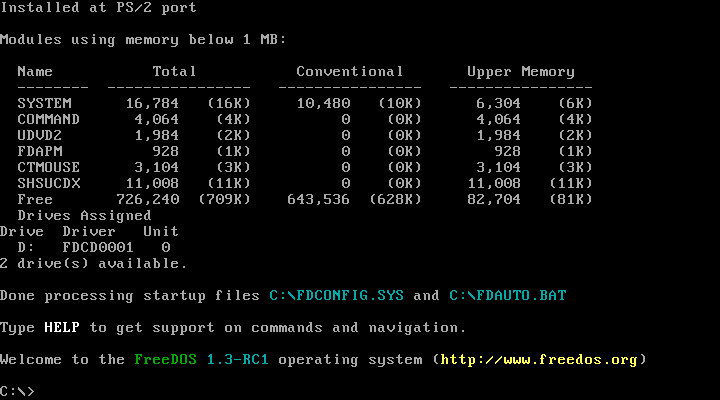What’s FreeDOS?
FreeDOS is an open source DOS-compatible operating system that you can use to play classic DOS games, run legacy business software, or develop embedded systems. Any program that works on MS-DOS should also run on FreeDOS.
It doesn’t cost anything to download and use FreeDOS. You can also share FreeDOS for others to enjoy! And you can view and edit our source code, because all FreeDOS programs are distributed under the GNU General Public License or a similar open source software license.
FreeDOS Software
Since 1998, each program included in the FreeDOS distribution is made available as a “package.” The distribution divides these FreeDOS software packages into groups, sometimes called “sets.”
The BASE package group contains only those programs that reproduce the functionality of classic DOS systems. The other package groups contain software that you may find useful, such as games, editors, and developer tools.
| BASE | Programs that provide the functionality of classic DOS |
|---|---|
| Archivers | Tools to compress files and create archives. |
| Boot tools | Utilities to help you boot your computer |
| Development | Development tools such as compilers and assemblers |
| Editors | Editors and simple word processors that let you edit text files |
| Emulators | Programs that emulate other systems |
| Games | Fun games that you can play |
| Networking | Utilities that support networks and connectivity |
| Sound | Programs that play music and sound files |
| Utilities | Tools and other useful programs that you might like to use |
Want to download the Software List in another format? You can also get the listing as a CSV file.
You can also download the programs individually from the FreeDOS files archive at Ibiblio.
What programs can I run in FreeDOS?
FreeDOS is a complete, free, DOS-compatible operating system. While we provide some utilities, you should be able to run any program intended for MS-DOS. Pretty much any program that works on MS-DOS will work on FreeDOS. You can also use FreeDOS on a network! However, you may experience problems running Windows on FreeDOS. For example, Windows standard-mode works on FreeDOS, but ‘386-mode Windows for Workgroups 3.11 does not.
We find most people use FreeDOS to do these things:
1. Play classic DOS games. You can play your favorite DOS games on FreeDOS. And there are a lot of great classic games to play: Wolfenstein 3D, Doom, Commander Keen, Rise of the Triad, Jill of the Jungle, Duke Nukem, and many others!
2. Run legacy software. Need to recover data from an old business program? Or maybe you need to run a report from your old finance system? Just install your legacy software under FreeDOS, and you’ll be good to go!
3. Develop embedded systems. Many embedded systems run on DOS, although modern systems may instead run on Linux. If you support an older embedded system, you might be running DOS. And FreeDOS can fit in very well.
Many people also use FreeDOS to install firmware updates on their computers.
Installing FreeDOS
You can download ISO image and boot the computer or virtual machine by that, then install it via wizard. It’s too easy but nostalgic.
What makes FreeDOS better?
FreeDOS includes many modern features not found in MS-DOS, or features that are significantly improved from MS-DOS. These features include:
- Multi-boot with Windows, including Windows 95 – Windows 2003, Windows NT, Windows XP, and Windows ME
- FreeCOM command line shell
- 7ZIP and InfoZip ZIP/UNZIP file archive programs
- ARACHNE graphical web browser and email client
- CD-ROM support with XCDROM and SHSUCDX (similar to MSCDEX)
- CUTEMOUSE mouse driver with scroll wheel support
- EDIT and SETEDIT multi-window text editors
- FAT32 file system support
- FDAPM power management: APM info/control/suspend/poweroff, ACPI throttle, HLT energy saving
- FDAV anti-virus and virus scanner
- FDNPKG package manager, with network support
- GRAPHICS prints to ESC/P, HP PCL and PostScript printers
- HTMLHELP help viewer
- JEMM386 (XMS, EMS) memory manager
- 32-bit protected mode drivers as JLMs (JEMM Loadable Modules)
- LBACACHE disk cache
- LBA large disk support
- LFN support via DOSLFN driver
- MPXPLAY media player: mp3, ogg, wmv with built-in AC97 and SB16 drivers
- PG text viewer (similar to LIST)
- Several utilities ported from Linux thanks to DJGPP
- UDMA drivers for hard disks and DVD drives: XDMA & XDVD
External Links
http://wiki.freedos.org/wiki/index.php/Main_Page











This brings back some memories, windows have relied on DOS applications for quite a long time and 32 bit OS still supports DOS applications. DOS is still a perfect OS if you are planning on running it on a NAS with network Data sharing services as it works well for both Windows and Linux.
Yes, DOS is still perfect OS and maybe it’s more secure. You must know that what do you want from OS!